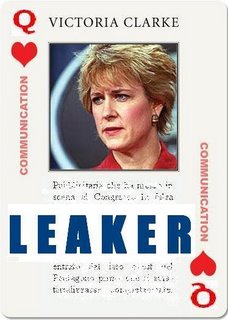
If the President is considering Torie Clarke to become his White House spokesman, he should ask her the following question:
"Were you or were you not the anonymous leaker behind the February 19, 2002 New York Times story that sabotaged the Defense Department's post-911 strategic influence effort against al Qaeda?"The answer: She was.
Waging a turf battle over an issue she didn't even understand, Clarke deliberately sabotaged a sensitive military influence program designed to fight the "war of ideas" in the terrorist heartland.
A disloyal team member, she was the secret leaker to the
New York Times to shut down the Office of Strategic Influence (OSI), in February 2002. Reporters James Dao and Eric Schmitt quoted her as if she were two separate people: sometimes as an anonymous "senior Pentagon official" with the damaging quotes, and other times by name as the official Pentagon spokeswoman expressing concern about the issue.
She never tried to defend the hearts-and-minds activity.
Then, using her power as Assistant Secretary of Defense for Public Affairs, Clarke forbade OSI officials from speaking to the press to defend the program.
She lied when she implied that OSI was going to use disinformation against the press. Using disinformation was strictly against OSI - and Pentagon - policy; disinformation wasn't needed when we had the truth on our side, and from a practical standpoint, disinformation is counterproductive because, once exposed, it would compromise the war effort.
An audit of all OSI papers and electronic memoranda requested by Senator Carl Levin exonerated OSI of the disinformation allegation. The DoD Inspector General found OSI had done nothing wrong.
The only disinformation in the OSI issue was Clarke's own misleading and untruthful statements to the
New York Times to wage her turf war.
Clarke failed to defend her department, her boss, and the president. She purposely allowed the controversy to spin so far out of control - timed over a three-day weekend when President Bush and Defense Secretary Rumsfeld were out of Washington - that OSI was permanently crippled and had to be shut down.
The net effect of the controversy was to make "influence" a dirty word in the war on terror, and effectively to remove lifesaving strategic influence from the American arsenal.
How many American lives were lost because of her cat fight?
And now, four years later, the president is still wondering why the US isn't winning the war of ideas - and possibly considering Clarke to be his spokeswoman.
President Bush and White House Chief of Staff Joshua Bolten should ask Torie Clarke: Were you or were you not the anonymous leaker behind the February 19, 2002 New York Times story that sabotaged the Office of Strategic Influence?Better yet, polygraph her.
 Fresh from our friends at The People's Cube: A new line of apparel and desk stuff in support of Defense Secretary Donald Rumsfeld. To buy some Rummy shirts for the spring season, click here.
Fresh from our friends at The People's Cube: A new line of apparel and desk stuff in support of Defense Secretary Donald Rumsfeld. To buy some Rummy shirts for the spring season, click here.
 Fresh from our friends at The People's Cube: A new line of apparel and desk stuff in support of Defense Secretary Donald Rumsfeld. To buy some Rummy shirts for the spring season, click here.
Fresh from our friends at The People's Cube: A new line of apparel and desk stuff in support of Defense Secretary Donald Rumsfeld. To buy some Rummy shirts for the spring season, click here.
 If the President is considering Torie Clarke to become his White House spokesman, he should ask her the following question: "Were you or were you not the anonymous leaker behind the February 19, 2002 New York Times story that sabotaged the Defense Department's post-911 strategic influence effort against al Qaeda?"
If the President is considering Torie Clarke to become his White House spokesman, he should ask her the following question: "Were you or were you not the anonymous leaker behind the February 19, 2002 New York Times story that sabotaged the Defense Department's post-911 strategic influence effort against al Qaeda?" Fox News picked up on this blogger's Center for Security Policy paper, "Mexico's Glass House," and featured it on Your World with Neil Cavuto and the O'Reilly Factor.
Fox News picked up on this blogger's Center for Security Policy paper, "Mexico's Glass House," and featured it on Your World with Neil Cavuto and the O'Reilly Factor. For those who get their boxers bunched about whether immigrants from south of the border should speak English if they want to stay here: In Mexico, Spanish is the official legal language.
For those who get their boxers bunched about whether immigrants from south of the border should speak English if they want to stay here: In Mexico, Spanish is the official legal language.